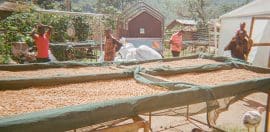Co-operatives – the slow food of social enterprise?

14 October 2020 at 5:25 pm
Social enterprises hold great potential to make our world better. To realise this transformative potential, we must ensure the fullness and diversity of this sector is recognised and embraced – including co-operatives, writes Antony McMullen.
David LePage (co-founder of Buy Social Canada) said at the Social Enterprise World Forum that until we move towards “success being measured in human, social and environmental capital, nothing in this world is going to change”. He added that “in the face of the social, climate and economic crises the world is currently facing, the need for a different system that values people and the planet over profit will only get stronger” and he said the best way to achieve this is to “bring in those communities that have been excluded or used for extraction”.
To make this change, those of us engaged in the social enterprise movement need to play our part with clarity of vision and unity of purpose.
A little over two weeks ago, the revered late chair of the New Economy Network Australia (and co-operative and Australian representative on the Intercontinental network for the promotion of social solidarity economy), David Thompson, issued an urgent call to action: “We must help civil society find a unified voice and thus unleash its power”. Alternatively, a house divided will not stand.
A strong and united social enterprise movement is an important part of a thriving civil society. So we need to ensure that all genuine social enterprises are present at the social economy table – and this must include co-operatives.
Social Enterprise UK identifies the famous 1840s Rochdale co-operatives as the pioneers of social enterprise. But strangely, I have heard people argue that co-operatives aren’t real social enterprises, or, on the other hand, that any entity with a social purpose can call itself a social enterprise (or at the very least simply self-identify as a socially responsible business).
So, what exactly is a social enterprise anyway?
In Australia the go-to definition is located in the seminal 2010 Finding Australia’s Social Enterprise Sector (FASES) study, which states that social enterprises: “are led by an economic, social, cultural, or environmental mission consistent with a public or community benefit; trade to fulfil their mission; derive a substantial portion of their income from trade; and, reinvest the majority of their profit/surplus in the fulfilment of their mission.”
This definition closely mirrors the seven internationally recognised official co-operative principles.
Crucially, “community benefit” – as referenced by FASES – can include “member benefits where membership is open and voluntary and/or benefits that accrue to a subsection of the public that experiences structural or systemic disadvantage”.
This understanding of community benefit perfectly mirrors the first co-operative principle, “open and voluntary membership”, which ensures that anyone who can fulfil the responsibilities of membership can join but importantly also allows co-operatives to be specifically established by groups experiencing exclusion and disadvantage.
This definition easily includes co-operatives established by and with Aboriginal and Torres Strait Islanders such as the Aboriginal Medical Service Cooperative Redfern, Tranby National Indigenous Adult Education and Training, and the Victorian Aboriginal Legal Service; in fact, 10 per cent of National Aboriginal Community Controlled Health Organisation (NACCHO) members are co-operatives.
Co-operatives also come in many different shapes and sizes. Co-operative Bulk Handling (CBH), established in 1933 by and with Western Australian grain growers, posted revenue of $4 billion in 2019 but is also classed as a charity and a not for profit. It’s probably a controversial thing to say but I think it is the largest social enterprise in Australia. At a time when many farmers are leaving the land, squeezed out by supply chain bullying by the supermarket duopolies, CBH is farmer owned-and-run, allowing farmers to get a fair price for their produce and for their surrounding communities to benefit.
Some say that some co-ops, like some of those referenced above, can call themselves a social enterprise but that profit-distributing co-operatives shouldn’t. However, according to the FASES definition of a social enterprise, there is only the requirement to “reinvest the majority of profit/surplus in the fulfilment of mission”. This is already baked into the co-operative model.
In a co-operative, distribution of any surplus is based on member contribution and, if a co-op is able to issue dividends to members these are strictly limited. This means that in effect, no co-operative is legally able to operate outside of the FASES majority “profit for community benefit” requirements.
What about nominally socially-focused mainstream businesses? Could they qualify as social enterprises too? A year ago nearly 200 CEOs of the biggest US corporations formally pledged to be better corporate citizens in relation to their workers, customers and the natural environment.
It is disappointing, then, to learn that once confronted with the fallout from COVID-19, these companies trumpeting social responsibility in reality prioritised shareholder dividends over their workers and communities when compared to similar companies that didn’t sign the pledge. In fact, the social virtue signalling companies were 20 per cent more likely to engage in redundancies and were less likely to donate to relieve the impact of COVID-19 or even provide customer discounts. So much for a commitment to do good.
The response was very different from US-based co-operatives, with many customer-owned mutual banks (credit unions) modifying loans and creating new loan products and rural electric co-ops getting supporting food banks. Another wide-ranging survey has questioned the effectiveness of voluntary corporate accreditation schemes and has instead suggested focusing on stakeholder ownership and participation. Of course, that’s not to say that all investor-driven corporations do the wrong thing. I just think the structurally embedded focus on external investors can make it harder for them to realise their social responsibility ambitions.
To contrast, Australian co-operatives must have a clear purpose, established as formal “primary activities”. External investors are welcome, but they can’t seize control away from the people who have created, and benefit from, the enterprise. Rather than extraction of profit away from the people who benefit from the business, the focus is on greater investment in the quality of services and products and long-term sustainability. Any surpluses made can be shared according to how much each member-owner of the enterprise contributes.
Crucially, the official co-operative principles are enshrined in Australian legislation, including democratic economic participation and care for the community. Directors of co-operatives in Australia are actually required to take into account these socially-focused co-operative principles as a statutory duty. Co-ops have a legally enforceable social enterprise accreditation system (it is illegal to call your enterprise a co-op unless it is registered as such under Co-operative National Law). These principles demonstrate how well the co-operative model dovetails with the aspirations of the broader social enterprise movement. Not only that, co-operative principles require co-operatives to cooperate with each other; prefiguring the Declaration of Interdependence of the B-Corp movement.
So why are co-operatives sometimes left out?
Thinking about it, a while back I asked a question on social media about this. One person commented that co-operatives are too slow moving for social entrepreneurship, but then followed by saying co-ops are in fact the longest standing and truest form of social enterprise due to “their democratic nature and horizontal models”.
Perhaps co-operatives are at the “slow food” end of the social economy table but according to UNSW law and new economy academic Bronwen Morgan there has been an undue emphasis in mainstream social enterprise on “outcomes rather than inputs, effects rather than important processes that emphasise internal governance, social relationships and participatory values”. The democratic and horizontal nature of the model can take up some time for all involved.
It’s true, co-operatives are not as easy to establish as perhaps some of the ones forged by social “heropreneurs”. However, depending on which study you look at, Australian mainstream start-ups have a 75 to 90 per cent failure rate within five years; whereas an admittedly modest survey of co-ops by the NSW Office of Fair Trading clocked survival at about 55 per cent over the same period (in the UK it is 80 per cent survival). A study by Greg Patmore and others from Sydney University recently found that the average lifespan of an Australian co-operative is about 25 years. Co-ops can be slow to establish but they can also last the distance. Mainly focusing on incorporated associations, companies limited by guarantee and proprietary limited companies, Social Traders found in 2016 that 38 per cent of social enterprises had been in operation over the previous 10 years (down from 62 per cent in 2010) and 34 per cent had been in operation for two to five years.
The head of the Business Council of Co-operatives and Mutuals (BCCM), Melina Morrison, says the co-operative movement is “not in competition but seeks collaboration” with other forms of social enterprise.
We need a united movement to protect our social economy.
A unified social enterprise movement could focus on common problems that impact on us all. A number of issues need addressing. Can the social purpose in social enterprises be better protected in the current legal framework? What happens when social enterprise (including any co-op) goes rogue and off mission, or even converts to a mainstream company that focuses almost solely on profit? Let’s talk about what matters.
The unique contribution that the co-operative movement can bring to a new conversation is its emphasis on economic inclusion. This moves us beyond sometimes placing an overemphasis on donors and experts providing for the deserving disadvantaged on the one hand, or, investors as owners extracting value for themselves at the cost of the rest of us (while often claiming to be good corporate citizens) on the other. Instead, we can emphasise mutuality and shared ownership to reduce economic inequality and increase social cohesion and shared responsibility.
Most of the comments I received back from that social media post were positive (and there were a lot of them). In fact any smatterings of critique were entirely constructive in nature. Perhaps it is just a matter of ensuring recognition and reciprocity (the latter something co-operators tend to focus on pretty strongly).
Much could be gained. In the UK a study found that the contribution of social enterprises had been significantly underreported. Leaving out co-ops (and mutuals like building societies) had resulted in an underestimation of the combined contribution of social enterprises to employment and GDP – a significant 3 per cent of UK GDP and over 5 per cent of employment. In Australia, Social Traders estimates that social enterprises contribute 3 per cent of GDP and employ 300,000 Australians. In 2016 BCCM found that co-ops and mutuals comprised more than 8 per cent of Australian GDP (in addition to co-operatives this figure includes mutuals).
Sure, there are a few definitional issues to sort out and some number crunching to be done. Co-operatives aren’t always included when counting the number of social enterprises in Australia. Imagine if we were all fully included – we could achieve so much by working together for a more socially focused and inclusive economy.
There is cause for cautious optimism. It’s no accident that Pope Francis has championed the cause of sainthood of the founder of the greatest confederation of worker co-operatives in the world located in Mondragon, the late Father José María Arizmendiarrieta Madariaga. And more recently he blessed the Korean credit union movement for its active implementation of the seven major inclusive financial policies that have embodied the spirit of sharing for the socially marginalised.
On a more modest scale and closer to home in Australia this spirit can be summed up by the actions of Cobargo Co-op in southern NSW. As highlighted in an article in The Fifth Estate (and in a recent ABC discussion), in the aftermath of the devastating bushfires the little local retailer opened straight away without power to get supplies out (using a simple paper ledger). Even a historic co-op like Cobargo can fast deliver when required.
Yes, co-operatives are difficult to form as they focus on delivering social, cultural and economic development for people as a self-help and empowerment tool (especially for marginalised groups and underserved communities); but, once established, they are long-lasting, and, via their member-driven nature in a crisis they can move just as quickly as other forms of social enterprise.
Now is the time to champion diversity and include all the social enterprises that truly benefit the public and our communities. As Melina Morrison says, “in light of the catastrophic situation facing society and the economy and therefore imperilling people’s livelihoods in unprecedented ways we can’t just return to the norm – but we should all be moving together to build back better”.
My special thanks to Employee Ownership Australia advocate Alan Greig, secretary of Earthworker Dan Musil, and PhD candidate Duncan Wallace (editor of the New Economy Network Australia Journal) who has recently drafted a ground-breaking report for the BCCM regarding the topic of social enterprise and co-operatives that has informed this article.







